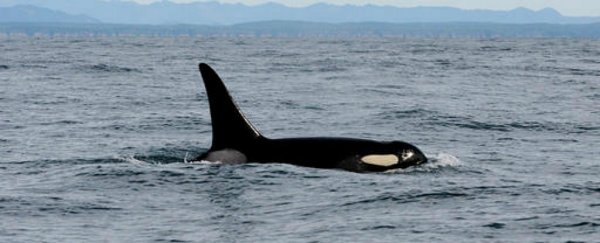A rare male orca that died earlier this year was killed by an infection caused by satellite tagging, the US National Oceanic and Atmospheric Administration (NOAA) has confirmed.
The 20-year-old orca, called L-95, washed up near Vancouver Island in Canada in March, just over a month after NOAA scientists had tagged it to find out more about its migration patterns.
Fragments of the tag were found in the orca's dorsal fin, causing suspicion that the device had had something to do with its death. This has prompted the NOAA to put a temporary ban on the tagging of endangered orcas.
Now the NOAA has released a report and autopsy results concluding that a fungal infection killed the animal, after entering its bloodstream through the satellite tag. An expert panel of five independent researchers reviewed and confirmed the report's findings.
The report also suggested that human error might have contributed to the death of L-95. During the tagging process, the tag allegedly fell into the water, and was only cleaned with alcohol before being inserted into the animal - according to NOAA protocol, tags need to be cleaned with both bleach and alcohol.
The tag was also attached near blood vessels at the base of the fin, which could have allowed the fungal infection to enter the orca's bloodstream more rapidly.
It's incredibly sad news for scientists, who use satellite tags to gain a wealth of information about the distribution and habitats of marine mammals, and generally consider them to be safe. This is the first confirmed orca death related to a satellite tag.
L-95, photographed above, was part of a rare community officially known as southern resident killer whales - one of four endangered communities of orca found in the North American Pacific Ocean.
The goal of the project was to use satellite tracking to find out where he and his pod went during winter, and how they found food, so that the government could put in place better policies to protect them.
L-95 was tagged back in February in Puget Sound, and his tag provided data for four days before it stopped communicating. A few weeks later, his body washed up on Vancouver Island.
The tag is made of a small satellite-linked transmitter, roughly the size of a 9-volt battery, that's applied to the dorsal fins with two 6-cm-long titanium darts.
The darts are designed to detach over time, leaving nothing behind in the whale - but the researchers have had to redesign the tags in the past due to complaints that orcas were being found with traces of darts still in them.
"Go back to the drawing board. Apply it less invasively," Kenneth Balcomb, senior scientist with the Centre for Whale Research in Washington, told Phuong Le at Phys.org after L-95's body was found.
Balcomb has been particularly outspoken on tagging, publicly calling the practice "overly barbaric".
"It's injuring the animals, and they're leaving pieces of hardware stuck in them that festers and causes tissue damage," he told Le.
Orcas aren't the only species who might suffer from satellite tagging.
Astudy back in 2011 found that king penguins in Antarctica that wore tracking bands had a 16 percent lower survival rate and 39 percent fewer chicks over a 10-year period. But there hasn't been much research done into the long-term effects on species such as sharks and whales.
As part of the NOAA's project, eight other Puget Sound whales have been tagged, and two have had minor problems, such as scarring at the tag site. But none are known to have any traces of the tag left in their tissue as they've since fallen off.
Brad Hanson, who leads the orca tagging program for the NOAA, is concerned about the animals' wellbeing, but believes that the tags provide such valuable conservation information, they're still worth using.
"It's provided us with a tremendous amount of information in a relatively short amount of time," Hanson told Phys.org. "I personally am concerned for the whales, but we're also charged with providing the best available science for our colleagues to make management decisions."
However, Balcomb, along with other scientists, argue that the NOAA already has enough data to improve conservation efforts in the US, and doesn't need anymore information from tagging.
"It doesn't make any sense to me to be stuck on more and more study, research, and statistical mumbo-jumbo when we know that they're predators, they need food and we know what food they need," Balcomb told Seattle news site King5 on Wednesday. "All we need to do is provide it."
There's no word as yet on whether the NOAA will resume tagging orcas in the near future, or change the practice to reduce risk to the animals.
But the latest report makes it clear that no one is taking the death of L-95 lightly, and if there's any positive that can come from it, hopefully it's safer conservation research in the future.
